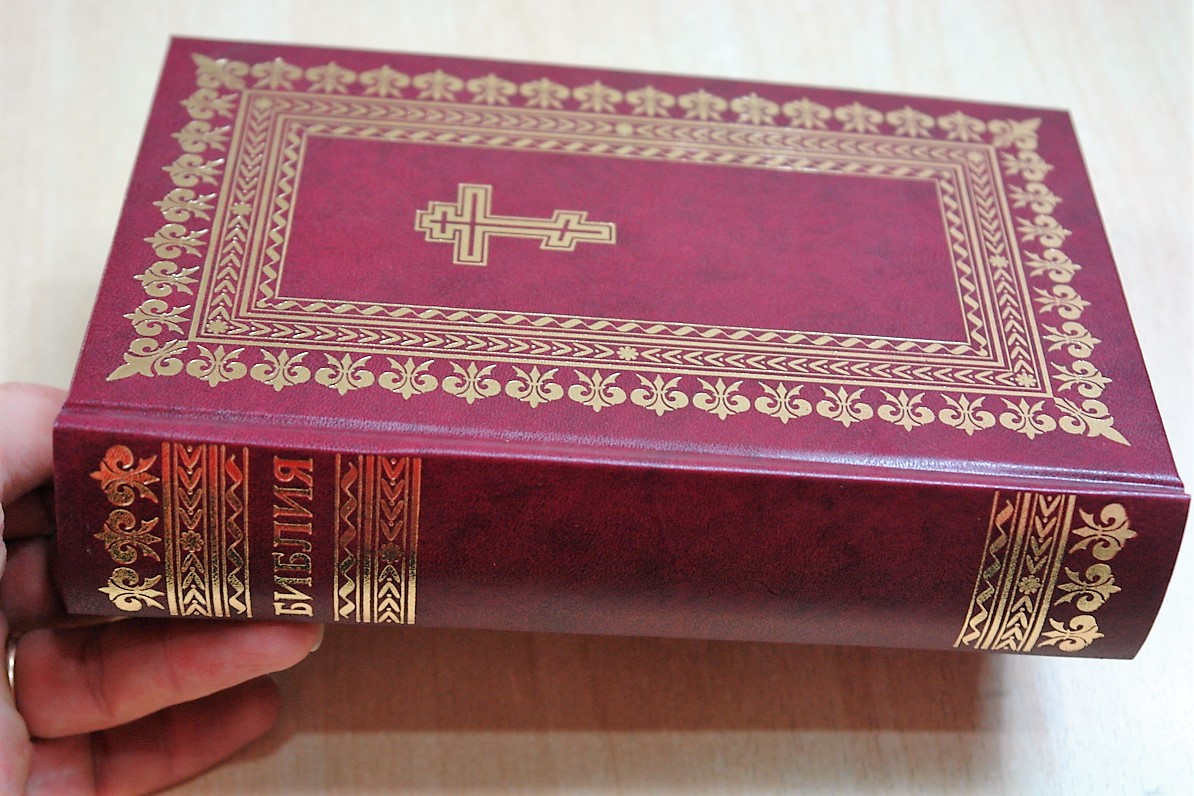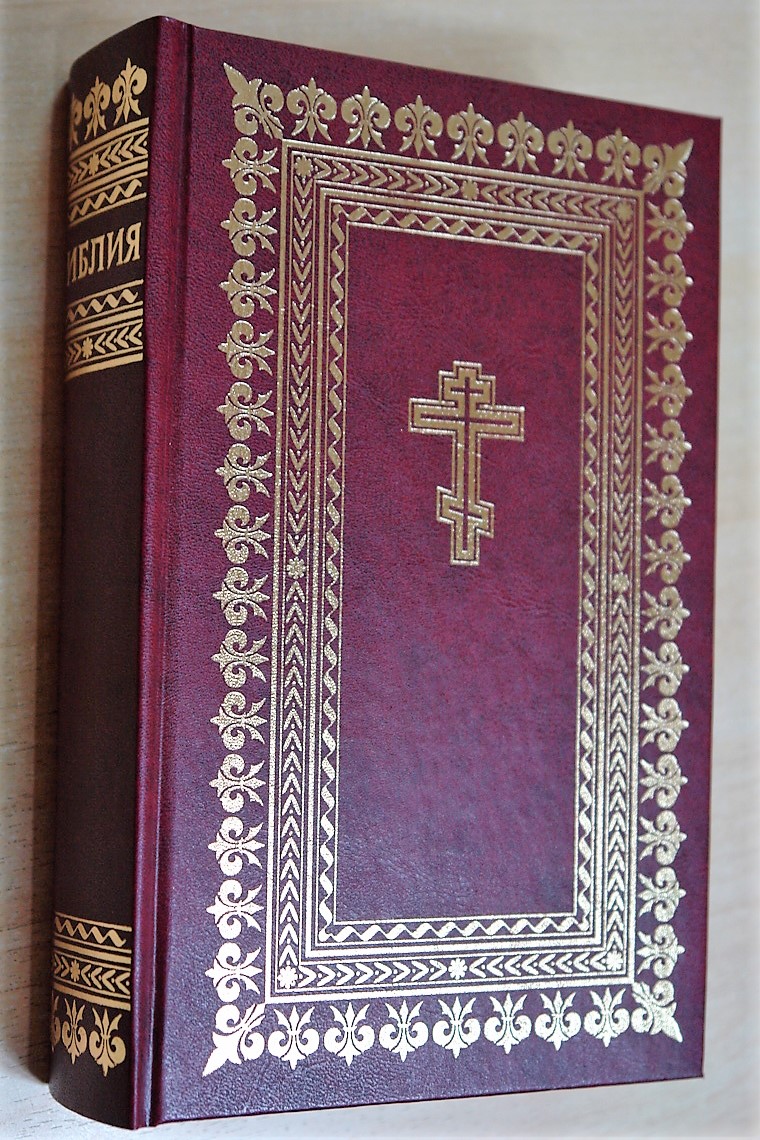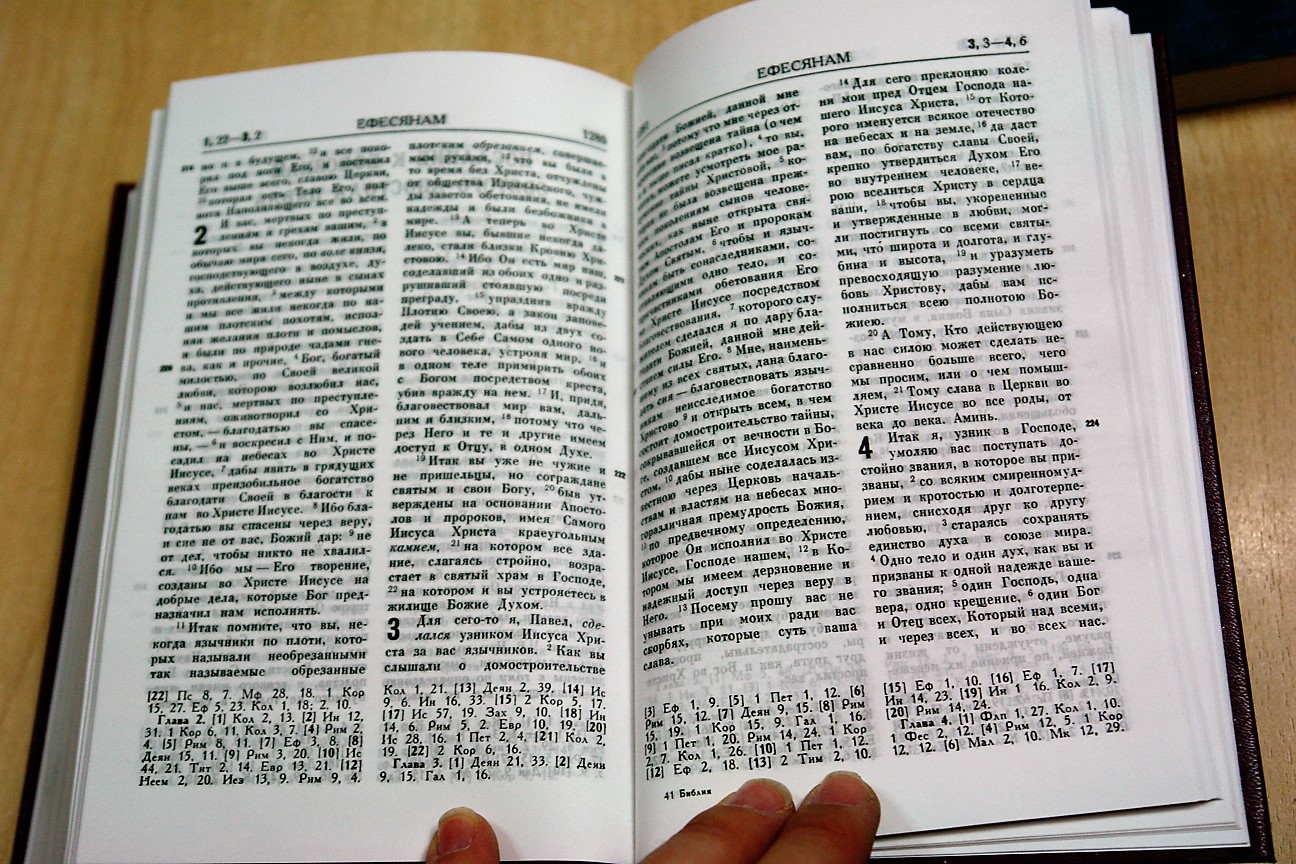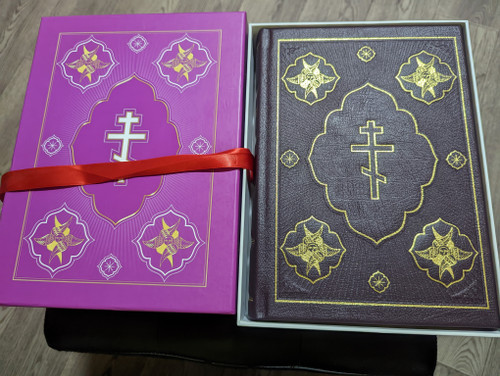Product Overview
Biblija Библия
Russian Orthodox Bible
Русская Библия Синодальный перевод

Product Details
- Hardcover 1348 Pages
- Publisher: Russian Bible Society
- Language: Russian
- ISBN-10: 5855240053
- ISBN-13: 978-5855240054 / 9785855240054
- Product Dimensions: 8.2 x 5.6 x 1.8 inches
- Shipping Weight: 1.9 pounds


The Russian Synodal Bible (Russian: Синодальный перевод, The Synodal Translation) is a Russian non-Church Slavonic translation of the Bible commonly used by the Russian Orthodox Church, Russian Baptists and other Protestant, as well as Roman Catholic communities in Russia.
The translation began in 1813, after the establishment of the Russian Bible Society and by permission of Czar Alexander I. The complete New Testament was published in 1820 and the Old Testament was already translated up to the book of Ruth when work on the project was halted in 1825(?). In that year the Russian Bible Society was disbanded and its translation work discontinued under a more conservative emperor Nicholas I (between 1825 and 1855) due to its suspected seditious influence on the Russian population. It was again resumed and completed in the next reign, of Alexander II.
The Most Holy Synod entrusted the completion of the translation to four Orthodox theological academies, in Moscow, Saint Petersburg, Kazan and Kiev. The complete Bible was published in 1876 and included the 1820s translation of the New Testament with very few changes, as well as the Old Testament, whose translation reflected the work done both before and after the period of reaction. The final editorship was performed by Filaret, Metropolitan of Moscow.
The translation of the Old Testament is based on the Jewish Masoretic Text, while that of the New Testament is based on the Greek printed editions of that time.[2] This decision was grounded on Filaret's 1834 note "On the need of the Russian Church for a translation of the whole Bible from the original texts to the modern Russian language" and reflected the growing acceptance in the Russian theological community of the contemporary Western standards of Biblical scholarship of the time.
Official permission to use the Masoretic Text as preserved by the Jews (rather than relying on the Septuagint and/or the Church Slavonic translations as preserved by the Christians) was granted to Filaret by the Synod in 1862, even though technically the translation was already mostly completed by that time.
In the 1870s, when the complete Russian Bible was being finalized, the linguistic norms of the Russian language had already changed when compared to those of the early 19th century, when most of the translation work was completed. Nevertheless, the translations that were done earlier remained largely unchanged, due mostly to the considerably smaller scale of the entire translation project compared to what was done by the Russian Bible Society before it was closed in the 1820s.
Also, due to its strong vocabulary and stylistic reliance on the more-than-1000-year-old Church Slavonic translation—a translation that in fact was done not into the Russian language of the time, but into a language spoken by the Southern Slavs—the Synodal version remains a linguistic phenomenon of its own kind that helped to shape some distinctive Slavonic-inspired features used both in the Russian spoken language and in Russian literature to this day.

![Biblija [Import] [Hardcover] Russian Orthodox Bible / Burgundy Beautiful Hardbound / Large Size / Russia / Русская Библия Синодальный перевод (9785855240054) Biblija [Import] [Hardcover] Russian Orthodox Bible / Burgundy Beautiful Hardbound / Large Size / Russia / Русская Библия Синодальный перевод (9785855240054)](https://cdn11.bigcommerce.com/s-62bdpkt7pb/images/stencil/600x600/products/161/54000/DSC09521__54845.1515578341.JPG?c=2)
![Biblija [Import] [Hardcover] Russian Orthodox Bible / Burgundy Beautiful Hardbound / Large Size / Russia / Русская Библия Синодальный перевод (9785855240054) Biblija [Import] [Hardcover] Russian Orthodox Bible / Burgundy Beautiful Hardbound / Large Size / Russia / Русская Библия Синодальный перевод (9785855240054)](https://cdn11.bigcommerce.com/s-62bdpkt7pb/images/stencil/50x50/products/161/54000/DSC09521__54845.1515578341.JPG?c=2)
![Biblija [Import] [Hardcover] Russian Orthodox Bible / Burgundy Beautiful Hardbound / Large Size / Russia / Русская Библия Синодальный перевод (9785855240054) Biblija [Import] [Hardcover] Russian Orthodox Bible / Burgundy Beautiful Hardbound / Large Size / Russia / Русская Библия Синодальный перевод (9785855240054)](https://cdn11.bigcommerce.com/s-62bdpkt7pb/images/stencil/50x50/products/161/54001/DSC09522__89210.1515578341.JPG?c=2)
![Biblija [Import] [Hardcover] Russian Orthodox Bible / Burgundy Beautiful Hardbound / Large Size / Russia / Русская Библия Синодальный перевод (9785855240054) Biblija [Import] [Hardcover] Russian Orthodox Bible / Burgundy Beautiful Hardbound / Large Size / Russia / Русская Библия Синодальный перевод (9785855240054)](https://cdn11.bigcommerce.com/s-62bdpkt7pb/images/stencil/50x50/products/161/54002/DSC09523__08865.1515578341.JPG?c=2)
![Biblija [Import] [Hardcover] Russian Orthodox Bible / Burgundy Beautiful Hardbound / Large Size / Russia / Русская Библия Синодальный перевод (9785855240054) Biblija [Import] [Hardcover] Russian Orthodox Bible / Burgundy Beautiful Hardbound / Large Size / Russia / Русская Библия Синодальный перевод (9785855240054)](https://cdn11.bigcommerce.com/s-62bdpkt7pb/images/stencil/50x50/products/161/54003/DSC09524__52845.1515578341.JPG?c=2)
![Biblija [Import] [Hardcover] Russian Orthodox Bible / Burgundy Beautiful Hardbound / Large Size / Russia / Русская Библия Синодальный перевод (9785855240054) Biblija [Import] [Hardcover] Russian Orthodox Bible / Burgundy Beautiful Hardbound / Large Size / Russia / Русская Библия Синодальный перевод (9785855240054)](https://cdn11.bigcommerce.com/s-62bdpkt7pb/images/stencil/50x50/products/161/54004/DSC09525__91911.1515578342.JPG?c=2)
![Biblija [Import] [Hardcover] Russian Orthodox Bible / Burgundy Beautiful Hardbound / Large Size / Russia / Русская Библия Синодальный перевод (9785855240054) Biblija [Import] [Hardcover] Russian Orthodox Bible / Burgundy Beautiful Hardbound / Large Size / Russia / Русская Библия Синодальный перевод (9785855240054)](https://cdn11.bigcommerce.com/s-62bdpkt7pb/images/stencil/50x50/products/161/54005/DSC09528__85305.1515578342.JPG?c=2)
![Biblija [Import] [Hardcover] Russian Orthodox Bible / Burgundy Beautiful Hardbound / Large Size / Russia / Русская Библия Синодальный перевод (9785855240054) Biblija [Import] [Hardcover] Russian Orthodox Bible / Burgundy Beautiful Hardbound / Large Size / Russia / Русская Библия Синодальный перевод (9785855240054)](https://cdn11.bigcommerce.com/s-62bdpkt7pb/images/stencil/50x50/products/161/54006/DSC09526__55834.1515578343.JPG?c=2)
![Biblija [Import] [Hardcover] Russian Orthodox Bible / Burgundy Beautiful Hardbound / Large Size / Russia / Русская Библия Синодальный перевод (9785855240054) Biblija [Import] [Hardcover] Russian Orthodox Bible / Burgundy Beautiful Hardbound / Large Size / Russia / Русская Библия Синодальный перевод (9785855240054)](https://cdn11.bigcommerce.com/s-62bdpkt7pb/images/stencil/50x50/products/161/54007/DSC09532__69803.1515578343.JPG?c=2)
![Biblija [Import] [Hardcover] Russian Orthodox Bible / Burgundy Beautiful Hardbound / Large Size / Russia / Русская Библия Синодальный перевод (9785855240054) Biblija [Import] [Hardcover] Russian Orthodox Bible / Burgundy Beautiful Hardbound / Large Size / Russia / Русская Библия Синодальный перевод (9785855240054)](https://cdn11.bigcommerce.com/s-62bdpkt7pb/images/stencil/50x50/products/161/54008/DSC09530__73794.1515578343.JPG?c=2)
![Biblija [Import] [Hardcover] Russian Orthodox Bible / Burgundy Beautiful Hardbound / Large Size / Russia / Русская Библия Синодальный перевод (9785855240054) Biblija [Import] [Hardcover] Russian Orthodox Bible / Burgundy Beautiful Hardbound / Large Size / Russia / Русская Библия Синодальный перевод (9785855240054)](https://cdn11.bigcommerce.com/s-62bdpkt7pb/images/stencil/50x50/products/161/54009/DSC09529__76875.1515578343.JPG?c=2)
![Biblija [Import] [Hardcover] Russian Orthodox Bible / Burgundy Beautiful Hardbound / Large Size / Russia / Русская Библия Синодальный перевод (9785855240054) Biblija [Import] [Hardcover] Russian Orthodox Bible / Burgundy Beautiful Hardbound / Large Size / Russia / Русская Библия Синодальный перевод (9785855240054)](https://cdn11.bigcommerce.com/s-62bdpkt7pb/images/stencil/50x50/products/161/54010/DSC09533__55012.1515578343.JPG?c=2)
![Biblija [Import] [Hardcover] Russian Orthodox Bible / Burgundy Beautiful Hardbound / Large Size / Russia / Русская Библия Синодальный перевод (9785855240054) Biblija [Import] [Hardcover] Russian Orthodox Bible / Burgundy Beautiful Hardbound / Large Size / Russia / Русская Библия Синодальный перевод (9785855240054)](https://cdn11.bigcommerce.com/s-62bdpkt7pb/images/stencil/50x50/products/161/54012/DSC09535__39547.1515578344.JPG?c=2)
![Biblija [Import] [Hardcover] Russian Orthodox Bible / Burgundy Beautiful Hardbound / Large Size / Russia / Русская Библия Синодальный перевод (9785855240054) Biblija [Import] [Hardcover] Russian Orthodox Bible / Burgundy Beautiful Hardbound / Large Size / Russia / Русская Библия Синодальный перевод (9785855240054)](https://cdn11.bigcommerce.com/s-62bdpkt7pb/images/stencil/50x50/products/161/54011/DSC09534__07147.1515578344.JPG?c=2)




